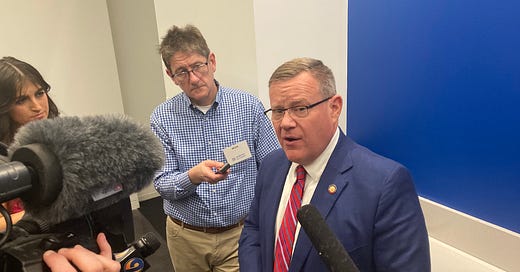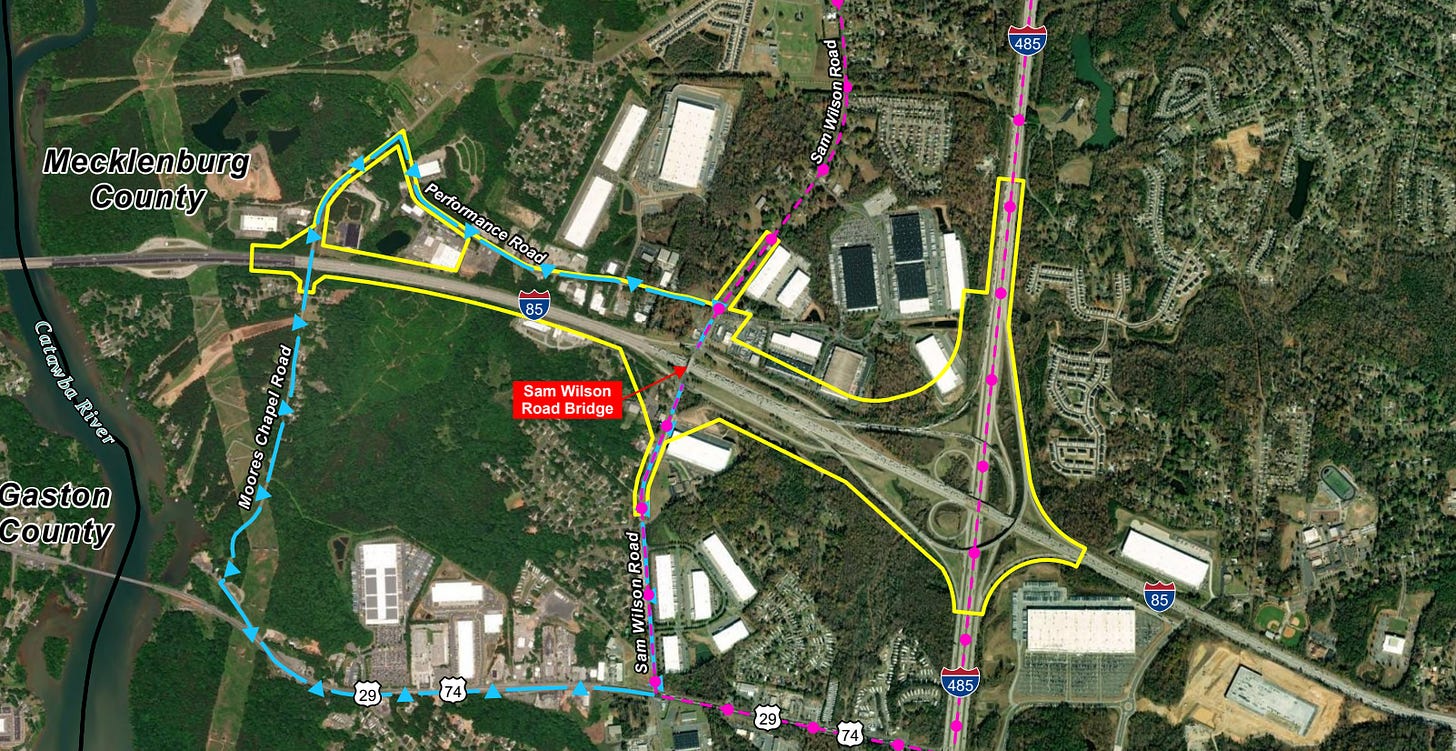'It has to be roads'
N.C. House Speaker Tim Moore explains his views on why road-building needs to be Charlotte's top transportation priority
You’re reading Transit Time, a weekly newsletter for Charlotte people who leave the house. Cars, buses, light rail, bikes, scooters … if you use it to get around the city, we write about it. Transit Time is produced in partnership between The Charlotte Ledger and WFAE.
In his own words: N.C. House Speaker Tim Moore on road-building, traffic-choked Atlanta and the need for new routes across Lake Norman and the Catawba River
N.C. House Speaker Tim Moore speaks to reporters on Monday following a discussion at the Charlotte Regional Business Alliance in uptown.
The speaker of the N.C. House, Republican Tim Moore of Kings Mountain, stopped by the Charlotte Regional Business Alliance this week along with Senate leader Phil Berger to discuss priorities in the upcoming legislative session that starts in April.
Moore is one of the most powerful officials in the state, and his views carry a lot of weight in the state legislature, which has a big say over transit and transportation funding and is critical to Charlotte’s transit plan. Moore, a lawyer who graduated from UNC Chapel Hill, is also running for a U.S. House seat and is heavily favored to be elected to Congress in November in a district that spans part of Mecklenburg and counties to the west, including Gaston and Cleveland.
Notably, Moore discussed transit and transportation at length, in both a panel discussion and in a subsequent conversation with local reporters.
(For an alternate perspective, stay tuned: Next Thursday, this Transit Time newsletter will feature a conversation with Shannon Binns of Sustain Charlotte, a nonprofit that advocates for environmental sustainability and smart growth.)
Below are Moore’s remarks on roads and public transit, lightly edited for clarity and length:
The No. 1 thing that I was proud of that we were able to do this year was to secure a dedication of $45 million to improve the absolute goat rodeo of an intersection that is 485 at 85. [applause] …
By the way, did y’all ever find out who the engineer was that designed it? I’m convinced it’s a State grad somewhere, just sayin’. …
That's an example of an intersection that was a problem, where we were able to … target additional contingency funds to deal with it.
But really, a comprehensive plan is critical. I know the city is working on a proposal to look at things that can be done. And we certainly want to see that. We want to be engaged. We want to make sure there are varying viewpoints that are brought forth on that. And when that plan comes in, we’ll look at it.
I do believe, though, that the top priority has to be roads. It has to be roads. That’s where the traffic issues have to be dealt with. A lot of these other things are great to be able to do, but it has to first and foremost be roads.
‘Goat rodeo’: House Speaker Tim Moore last year allocated $45 million to speed up the expansion of the I-485 interchange at I-85 in western Mecklenburg County. (Image from N.C. Department of Transportation)
We see so many of our roads that are just choked up constantly. And I talk with a lot of my friends that live right here in the city of Charlotte. And I would submit to you —as someone who is by the way in Charlotte every day now pretty much — I have found every traffic hotspot in this city and in this county. They’re good spots for yard signs, usually because people are stuck there. …
Important for economic development
If you talk to developers, they’ll tell you it’s one of the big issues. We have this amazing economic generator with the airport just a few miles that way. We need to find ways to keep the traffic moving around there to increase even more investment.
We’ve been very fortunate with the number of the large distribution centers. You all see the growth that we have here in our region. But we have to make sure that the roads are flowing and are not clogged up. …
The issue with the rail right now is the density to support it. Most of us have traveled either to other countries or other cities where you have the density to support mass transit in a very significant way. And I don’t know if Charlotte is there yet, but I think it’s appropriate, certainly, to plan for it in a lot of ways.
A lot of the light rail has been very successful. If you look at the line that runs out to UNC Charlotte, you look at the rail that runs through town, goes down to South End, it has paid a lot of benefits. So I certainly think it’s something to look at.
But the most pressing issue right now is the way 95% of the people get to and from work, or wherever, and that is in a car. And if you look at the regional growth that we have, we really need to continue to invest in our roads and in our road infrastructure.
More bridges across Lake Norman and the Catawba River
We know we need more ways across our rivers. If you look, for example, at I-77, you’re constrained right there with one bridge going across the lake. Everything gets jammed in there. If you look at going west across the Catawba River, right now you have two crossings: You have Highway 74, and you have Interstate 85. So [we need] an appropriate discussion about what some other crossing might look like — not going down the Garden Parkway thing that was dealt with years ago, not that — but some way to have another crossing, because we are continuing to grow.
Local officials have studied the possibility of a new bridge across the Catawba River, called the “Catawba Crossing” project, but it is likely decades away. Transit Time explored the issue in 2022. (Image from Catawba Crossings Feasibility Study)
It’s a good problem to have. And so if you look at the proposals that we put in place at the state level, it’s all been about increasing that mobility. …
I think [the solution] has to be significantly weighted toward roads. I think it’s fine to have to have a part that deals with rail. It’s an answer, but it’s more of a long-term thing. But you’ve got to deal with short-term issues right now.
Let’s not become Atlanta
We’ve got really serious traffic problems right now. And at a certain point, it becomes more than just an inconvenience. What starts happening is that companies that are looking to come here say they’re going to go somewhere else, because they don’t want to have to battle the traffic. It also becomes an issue for your workforce.
You know, if folks are spending an hour sitting in the car in traffic, they’re going to look at doing something else. I mean, look at how it’s impacted some of the major cities. Look at Atlanta. We don’t want to be Atlanta, right? We do not want to be Atlanta with the traffic mess.
And we have to stay on top of it. Atlanta put a lot of money into, I think it’s called MARTA, their rapid transit that they have. It still has super-low ridership. I mean, you just don’t have enough usage. So yeah, there’s a part there to fund that. But really, at the end of the day, you need to put the money in roads. …
Still awaiting city’s plan
I think the city needs to determine what exactly its plan is. And I know there are differing opinions on the city council, there are differing opinions at the county commission. And then, of course, their opinions may be very different than what we have at the state level.
What somebody’s got to show me is what is going to, at the end of the day, relieve the traffic issues, and ensure that you have a better use — and it can be multimodal — but a better use of traffic and those limited resources, because we don’t just have unlimited resources to do everything. And if you’ve talked to most people, they’ll tell you, it’s got to be roads.
Any thoughts? Drop us an email, or if you’re a paying Ledger member, leave a comment:
Coming next week: a different perspective
Next week in Transit Time: A conversation with Shannon Binns, executive director of Sustain Charlotte, which advocates for environmental sustainability and smart growth.
Transit Time is a production of The Charlotte Ledger and WFAE. You can adjust your newsletter preferences on the ‘My Account’ page.
Did somebody forward you this newsletter and you need to sign up? You can do that here:
Other affiliated Charlotte newsletters and podcasts that might interest you:
The Charlotte Ledger Business Newsletter, Ways of Life newsletter (obituaries) and Fútbol Friday (Charlotte FC), available from The Charlotte Ledger.
The Inside Politics newsletter, available from WFAE.








Mr Moore is correct in several aspects and I’m glad to read his willingness to include rail in a package of solutions. He’s also right that we don’t want to like Atlanta — everyone says that— but then his major priority on big roads guarantees that we will.
A “roads-first” strategy has to move away from simply widening and widening and widening ad infinitum and focus more on building a network of local connectors (like the new E-W connector proposed in Mooresville). Years ago (1990s) when I was engaged in a lot of planning work in N Meck, every time I laid out a growth strategy for the three towns ( H’sville, Cornelius and Davidson ) I included three things: 1. reserved rights of way for e-w and n-s LOCAL connectors (traffic-calmed boulevards not 4-lane highways) so local traffic had several choices of how to move around, and 2. Corridors of preserved and connected open spaces for wildlife and recreation.( and visual beauty), and 3. Focal “urban villages” of mixed uses to provide options of biking or walking to shops etc.
I worked with town staff, elected officials and citizens from 1994 though the early 2000s but coordination of all these efforts was hampered by changes of elected officials with newcomers from other localities unfamiliar with advance planning ideas and who were more interested in the conventional (outdated) ideas they were familiar with. So the coordinated vision withered in the vine….
That sad tale shows just how hard it is in this state to do any kind of the coordinated planning needed to solve some of our problems. Someone once said that doing the same thing over and over and expecting a different result is one definition of insanity……Could he/she be talking about us?
(Typed with 1 finger on my I-Phone. Sorry for typos and some clumsy grammar!)
David Walters
Retired architect and town planner
Tim Moore has refreshing common sense.